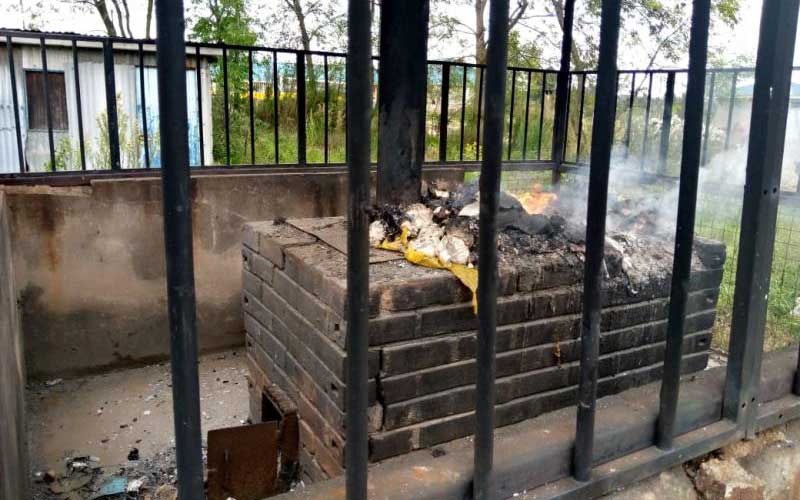
A medical waste burning chamber at Ol Kalau Hospital in Nyandarua County. [Mercy Kahenda, Standard]
Counties in the Rift Valley region are struggling to manage infectious medical waste amid the Covid-19 pandemic.
Some of the counties do not have standard incinerators to manage the waste.
Laikipia County, for example, collects approximately 150 kilogrammes of medical waste daily, which is managed within burning chambers.
The medical waste is segregated at the hospital level by a team of public health officers in colour-coded bin liners for transportation to the burning chambers, which are at Nyahururu County Hospital and Nanyuki Teaching and Referral Hospital. Covid-19 waste is also managed at the facilities.
However, the collection and transportation of waste is a challenge as it risks infections to handlers and as well as the local community.
Transportation is also done in open lorries, which is also a health hazard.
Safety measures observed at the burning chambers are wanting as, for example, sharp items like needles do not burn to expected temperatures, making the site a magnet for infectious diseases.
Some of the waste at the burning chamber, including used cotton wool, is usually blown away by the wind to the compound, forcing the employees to pick them for disposal.
Birds also scavenge at the chambers, tear waste like surgical masks and used cotton wool as the burning chamber is open.
Private facilities on the other hand are being accused of disposing waste at dumpsites where children scavenge for valuables.
“Needles and other metallic waste do not burn, forcing us to bury them as a safety measure,” a health employee said.
A health official who requested anonymity because he is not allowed to speak to the media said some of the support staff have been oriented in safe handling of waste.
Infectious waste
But the supervision of medical waste is undertaken by Public Health Officers, who have adequate knowledge of how such waste should be handled.
Plans are, however, underway to set up an incinerator at Nanyuki Teaching and Referral Hospital, according to Health Executive Joseph Lenai. The facility will be constructed at a cost of Sh40 million.
Health records indicate that the county has a total of 115 health facilities, among them two-level four hospitals.
The state of incinerators managing infectious waste in Nyandarua County is also in a pathetic state.
All waste is managed at burning chambers due to a lack of standard incinerators.
The burning chambers are located at Ol Kalau and Engineer hospitals.
The burning chimney at Ol Kalau has caved in with combustion not as per the public health standards.
Choking smoke seals the air that is hazardous to human health as it spreads to the neighbouring homesteads.
Examples of waste disposed in the pit before being burnt include used cotton wool, syringes, and gloves contaminated with blood, drips, and general waste.
Despite the availability of a burning chamber located adjacent to the pit, medical waste including bottles of expired and used drugs, can be spotted within the locality.
Health executive John Mungai said the Sh2 million incinerator installed at JM Kariuki Hospital will be operationalised soon.
The facility has a capacity of managing 50 kilogrammes of medical waste per hour.
“We are planning to install electricity at the facility to enable us manage the medical waste in a proper manner,” said the official.
There is an additional incinerator at North Kinangop Mission Hospital.
Baringo County has two combustion incinerators at Kabarnet and Eldama Ravine hospitals.
According to public health officer Samuel Ruto, the county produces at least 320 kilogrammes of medical waste daily.
Other hospitals across the country transport waste to Kabarnet County Hospital for management.
There are at least 206 public facilities in the county, where waste is segregated for transportation to the incinerators.
Ruto said at least 850 health care workers have been trained on infection prevention through proper handling of hospital waste at facility level.
“Waste produced amid Covid-19 has slightly increased, and to avoid infections, we have sensitised all health workers on handling it,” said Ruto.
Bomet County recently constructed an incinerator at Longisa Hospital. Before then, the waste was managed at Tenwek Mission Hospital.
Notably, Nakuru County has produced more than 16,477kg of health care waste during the Covid-19 period.
 The Standard Group Plc is a multi-media organization with investments in media
platforms spanning newspaper print
operations, television, radio broadcasting, digital and online services. The
Standard Group is recognized as a
leading multi-media house in Kenya with a key influence in matters of national
and international interest.
The Standard Group Plc is a multi-media organization with investments in media
platforms spanning newspaper print
operations, television, radio broadcasting, digital and online services. The
Standard Group is recognized as a
leading multi-media house in Kenya with a key influence in matters of national
and international interest.











